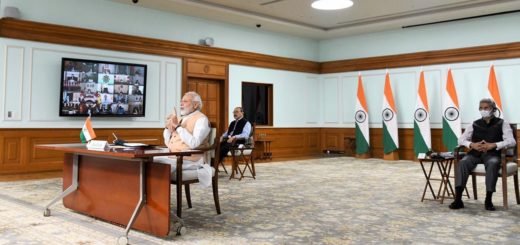Human Rights violation in China: A case study on Uighur Muslims
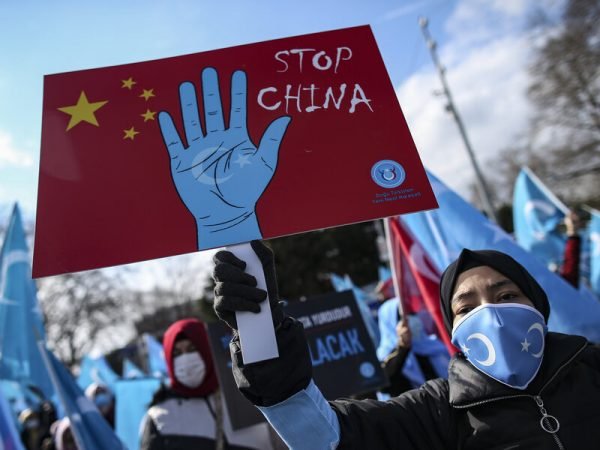
Human Rights: Human Rights perhaps is the most pressing issue across the globe. The basic definition of human rights state that these are rights that all people have, regardless of their race, gender, nationality, ethnicity, language, religion, or other status. The right to life and liberty, freedom from slavery and torture, freedom of thought and speech, the right to work and education, and many others are all protected by human rights. These rights are available to everyone, without exception. States tend to commit human rights at a large-scale directly or indirectly by a state. Violations might be committed by the state on purpose or as a result of the state’s failure to prevent the violation. Various actors, such as police, judges, prosecutors, government officials, and others, might be engaged when a state violates human rights.
In this paper, I intend to focus on the violation of human rights by the Chinese government on a religious minority group that is- Uighur Muslims. The paper shall proceed as follows: a general trend on the violation of human rights committed by the state, followed by a brief history of the Xinjiang Province. In the later section of the paper, we shall focus on the gross violation of human rights by the state under the following heads:(i) Uighur Culture: Diluted and Dissolved (ii) Forced sterilization (iii)Forced labour (iv) Physical and mental abuse. Following this a brief analysis of the same will be provided.
Human rights violations in China: A recent trend
China is a one-party authoritarian state with a history of human rights violations committed in its name. China’s rulers have traditionally prioritized “state sovereignty” over “individual rights.” In fact, after the Tiananmen Square democratic movement, China did not officially recognize human rights until the early 1990s. The Chinese government has signed and ratified more than twenty international human rights treaties; yet, China has disregarded many of these international norms, and the government’s attitude appears to be essentially unchanged. Journalists, lawyers, artists, and activists are among the most frequent critics of human rights violations today.
Human rights violations in China are often difficult to prosecute since the country’s legal system is intended to limit individual rights. This was demonstrated in 2015 when China passed legislation that effectively suppressed dissent under the pretense of expanding national security. Among them is the anti-terror law Opponents assert that the law’s definition is far too broad and could stifle the rights of ethnic and religious minorities. The Chinese government is one of the world’s most flagrant violators of religious freedom.
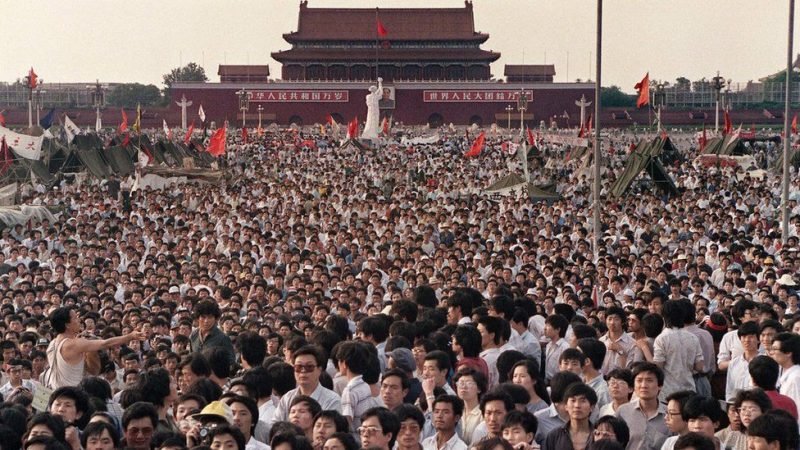
[1]Authorities are increasingly using mass surveillance systems to maintain social control. In 2018, the government continued to collect biometrics such as DNA and voice samples on a massive scale, use them for automated surveillance, develop a nationwide reward and punishment system known as the “social credit system,” and develop and implement “big data” policing initiatives aimed at preventing dissent.
Amid the pandemic, the Chinese government’s authoritarianism was on full display in 2020 as it grappled with the deadly coronavirus outbreak first reported in Wuhan,” the HRW report said, describing authorities’ initial cover-up of the outbreak and the punishment of whistle- doctors like Li Wenliang and journalists like Zhang Zhan who reported on the Wuhan lockdown and surveillance and harassment of virus victims’ families
The Xinjiang province
Xinjiang is a landlocked autonomous region of China, located in the country’s northwest near Central Asia. It is China’s largest province-level division and the world’s eighth-largest country subdivision, encompassing over 1.6 million square kilometers (620,000 sq mi) and home to over 25 million inhabitants. Xinjiang, a predominantly desert province rich in energy resources, makes up 17% of Chinese territory and is one of China’s poorest administrative entities while having a high level of economic development. Xinjiang has risen in prominence due to its natural riches, its proximity to Central Asian countries with abundant natural resources, and China’s new Grand Strategy focusing on the West. The region is vital for three reasons: it is rich in energy resources; it serves as a north-western buffer to protect China’s geopolitical core, which is close to the coast; and it is China’s gateway to Central Asia and the Middle East, and therefore serves as an important crossroads for the new silk routes (BRI) directed towards Europe.
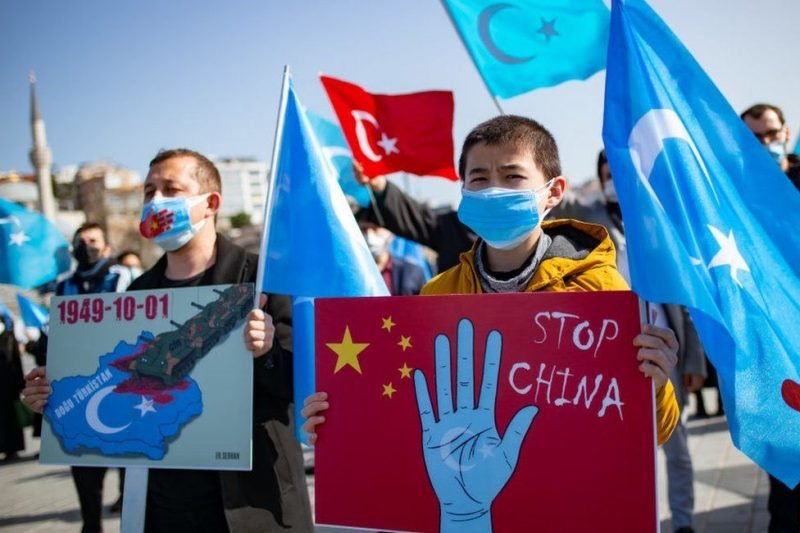
The non- Chinese population, the Uighurs, primarily inhabit it. Uighurs are Turkic people who speak a language closely related to Uzbek in Uzbekistan and distantly related to Turkish in Turkey. They have historically dominated Xinjiang, which they regard as their homeland and refer to as Eastern Turkestan. Most of the region’s minor ethnic groups, such as the Kazakhs, Kyrgyz, and Chinese-speaking Hui, are historically and culturally Muslim, as demonstrated by their clothing, food, and built environment. In 1955, the People’s Republic of China designated Xinjiang as an autonomous territory. Beijing has promoted the influx of Han (the predominant Chinese ethnicity) into the region to drive its economic development from the year 2000. The Han, in reality, are concentrated in the north, near the significant oil deposits. The region’s unrest and instability stemming from the problematic coexistence of Han and Uyghurs.
Human rights violations in China: A recent trend
Uighurs: Awful state of affairs
Riots erupted in Xinjiang in July 2009 in response to a violent confrontation between Uyghur and Han Chinese factory workers that resulted in over a hundred deaths. From 2009 through 2016, Uyghur terrorists killed hundreds of Han Chinese in coordinated attacks in the aftermath of the riots. These included syringe attacks in August 2009, a bomb-and-knife attack in Hotan in 2011, a knife attack in Kunming railway station in March 2014, a bomb-and-knife attack in Ürümqi railway station in April 2014, and a car-and-bomb attack in Ürümqi street market in May 2014. Uyghur separatists carried out the attacks, with the Turkistan Islamic Party orchestrating some of them.
During the 2008 Beijing Olympics run-up, the Chinese state emphasised weiwen (stability maintenance), which led to an intensification of repression across the country. Following the Ürümqi riots in July 2009, Zhang Chunxian replaced former CCP secretary Wang Laquan, who had been in charge of religious policies in Xinjiang for 14 years. Following the unrest, party theorists began calling for the establishment of a more monocultural society with a single “state-race,” allowing China to become “a new type of superpower.”
Zhang Chunxian was the first to develop policies to achieve this goal. The Strike Hard Campaign Against Violent Terrorism was launched in 2014 after a secret meeting of Communist Party leadership in Beijing to find a solution to the problem. China officially launched the campaign in Xinjiang in May 2014 in response to rising tensions between Han Chinese and Uyghur people in the region. “Practice has proven that our party’s rule approach in Xinjiang is correct and must be maintained in the long run,” CCP general secretary Xi Jinping said in announcing the campaign.
The violation of International laws: Uighur Muslim
The international community is beginning to appropriately identify China’s “Strike Hard” campaign against Uighurs and other Muslim minorities in Xinjiang, using terms like “genocide” and “concentration camps”. The programme, ostensibly portrayed as a counter-terrorism operation by the Chinese government, breaches a half-dozen international treaties as well as China’s constitution. Article 36 expressly states that “no state organ, public organization, or individual may compel citizens to believe in, or not believe in, any religion.” But the same section cautions that the state only protects “normal” religious activities that do not “disrupt public order, impair the health of citizens, or interfere with the educational system of the state.” This section of the paper shall analyse the violation the International Law by China in context to Uighur Muslims.
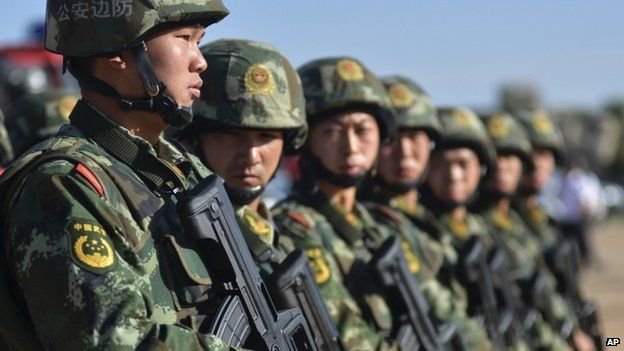
Uighur culture: Diluted and dissolved
Through the persecution of religious freedoms and forced integration, China has made a concerted effort to dilute and obliterate all remnants of Uighur culture. Adopting practises akin to brainwashing; prisoners have claimed being forced to renounce their ideas and vow allegiance to the CCP. Muslims are barred from executing traditional Islamic funeral rites, marriage ceremonies, and circumcisions; giving their children Muslim names; growing long beards; wearing head and facial coverings; fasting throughout Ramadan, and making pilgrimages to Mecca even when they are not in the camps. China has even gone above and beyond to force Muslims to consume pork and drink alcohol, as well as waging a campaign against halal food in Xinjiang.
Several treaties protect the rights to religious, cultural, and social self-determination as fundamental freedoms, China is a signatory to. It has violated Articles 1,2, and 15 of the ICESCR; Articles 2 and 5 of the ICERD; and Articles 18-20 of the UDHR.
Forced sterlization of Uighur women and distruption of family life
The Chinese government is enacting draconian measures to reduce birth rates among Uighurs as part of a broad campaign to reduce the country’s Muslim population, whilst it encourages the Han majority to have more children.
[2]While some women have previously spoken out about coercive birth control, government statistics, official papers, and interviews with 30 ex-detainees, family members, and a former detention camp instructor show that the practise is far more prevalent and systematic than previously known. The campaign in Xinjiang’s far west area, which has lasted four years, has resulted in what some experts are calling “demographic genocide. “According to the interviews and data, the state routinely conducts pregnancy checks on minority women and forces intrauterine devices, sterilisation, and even abortion on hundreds of thousands of them. Even as the use of IUDs and sterilisation has decreased across the country, it has increased dramatically in Xinjiang. Mass detention is used as a threat and a punishment for those who do not cooperate with the population control methods. The government has poured hundreds of millions of dollars into birth control has transformed Xinjiang from one of China’s fastest-growing regions to among its slowest in just a few years. In 2017, the Xinjiang government raised the already severe fines for breaking family planning restrictions, bringing them to at least three times the county’s annual disposable income. China is luring land, employment, and economic subsidies to entice Han migrants to Xinjiang in additional efforts to shift the region’s population balance. It also encourages Han Chinese and Uighur intermarriage.
Beijing initiated the “Pair Up and Become Family” programme, which deploys CCP members called “cadres” to stay with Muslim families regularly, entering their private lives. The goal of the initiative is to force Uighurs to blend in with the Han majority. Any deviations from the Party’s “prescribed lifestyle,” including religious habits such as praying and wearing traditional Muslim clothing, are reported by cadets. The movements of families are constantly monitored and tracked. Cadres sometimes sleep in the same bed with their Uighur hosts, and once male relatives are detained at state-run camps, women and children are frequently the only ones left in the house. Children are either placed in orphanages while their parents are jailed in camps or moved elsewhere in China for state-mandated schooling. “Thousands of Uighur youngsters are taken away from their families and immersed in Han Chinese institutions, distant from their native lands,” according to the “Xinjiang Classrooms” strategy.
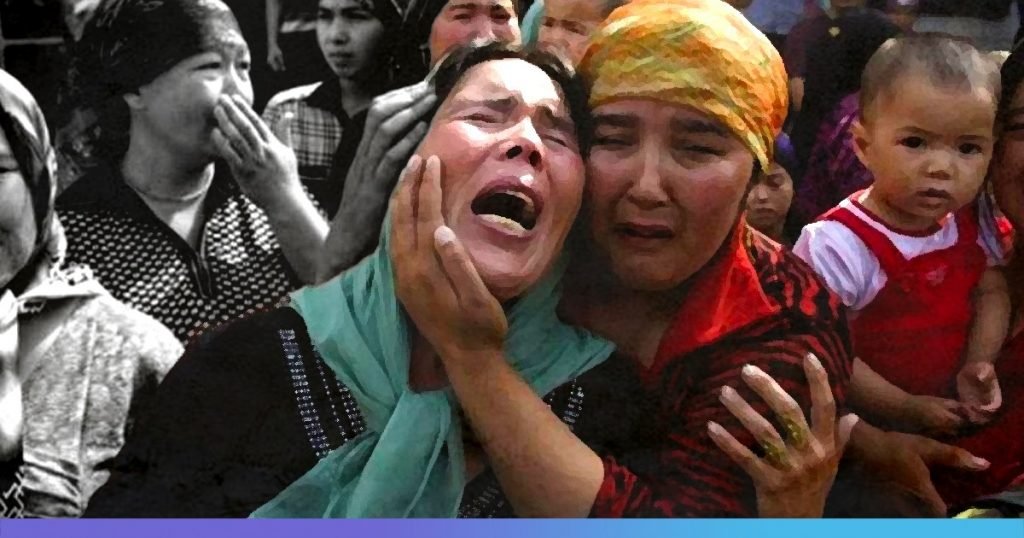
The Pair Up and Become Family and Xinjiang Classrooms programs breach Articles 12, 16, and 26 of the UDHR, which protects the family from state interference as the “natural and fundamental group unit of society” and grants parents the right to choose how they educate their children. Article 10 of the ICESCR provides similar protections, and Article 2 of the Genocide Convention lists “forcibly transferring children of the group to another group” as a potential means of committing genocide.[3]
Forced labour
[4]According to a report by Australian Strategic Policy Institute, between 2017 and 2019, over 80,000 Uighurs were transported out of Xinjiang to work in factories across China. They are constantly monitored, are not allowed to participate in religious customs, and have limited freedom of movement. They live in segregated dormitories and undergo training outside working hours. It is tough for them to refuse their assignments, and those who refuse to complete the government’s assigned tasks are constantly threatened with arbitrary detention.
China is not a signatory to any of the International Labour Organization’s anti-forced labour conventions. Article 23 of the UDHR, on the other hand, guarantees basic protections against forced labour, while Article 4 of China’s constitution promises to safeguard minorities.
Physical and mental abuse
Former Uighur detainees describe crowded cells, brainwashing, waterboarding, torture during interrogations, food deprivation as punishment, beatings, being shackled to chairs for long periods of time, sleep deprivation, being forcibly drugged, being shocked in an electric chair, and other forms of extreme physical and mental abuse. There have also been reports of systematic rape and sexual humiliation of Uighur inmates.[5]
By “causing serious bodily or mental harm” to targeted Uighur victims, these acts breach Article 2 of the Genocide Convention. The atrocities also violate Article 5 of the International Covenant on Economic, Social, and Cultural Rights (ICERD) and Article 5 of the UniversalDeclaration of Human Rights (UDHR), both of which guarantee protection from torture and punishment regardless of race, sex, religion, or other status.[6]
The role of International Organisations
- The United Nations and ICC
The International Criminal Court and the United Nations prosecute crimes that harm the whole international community, such as genocide, crimes against humanity, war crimes, and aggression. However, in order for an ICC ruling to be binding on a State, the State must acknowledge the ICC’s jurisdiction. However, in order for an ICC ruling to be binding on a State, the State must acknowledge the ICC’s jurisdiction.
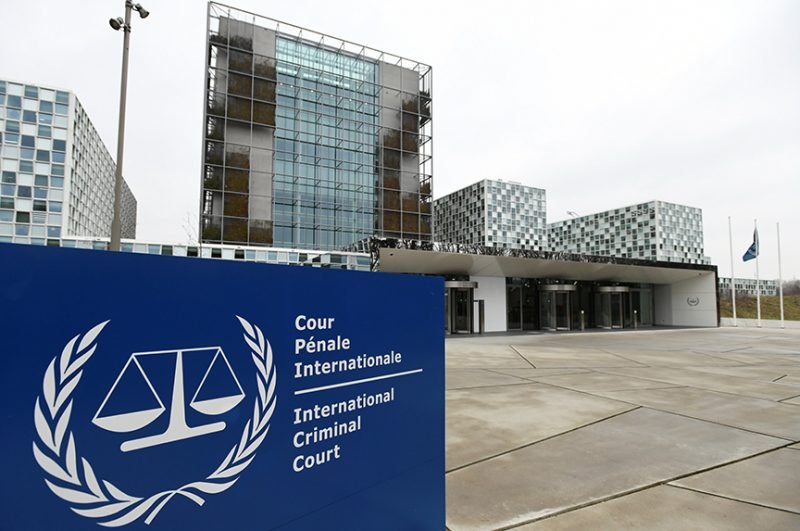
As per Article 12(2) of the Rome Statute, for the ICC to exercise jurisdiction, the State must accept the jurisdiction. But, as per Article 13 (b) of the Rome Statute, the ICC may exercise its jurisdiction if such crimes were referred by the UNSC to the ICC prosecutor under a resolution adopted under Chapter VII of the UN Charter.
Considering China does not acknowledge the International Criminal Court’s jurisdiction, neither of these two options is available to prosecute China for crimes against the Uighur community. Second, as a permanent member of the UN Security Council, China uses its veto power to prevent a resolution calling for its prosecution and Russia also being the member of UNSC supports China by using it own veto power to prevent the same. The ICC refused to investigate the alleged incarceration and genocide of Uighur Muslims in China because Prosecutor Fatou Bensouda stated that China is not a member of the ICC and that the alleged crimes committed against Uighur Muslims were not crimes against humanity. As a result, they would not be subject to the ICC’s jurisdiction
- Organisation of Islamic Organisation (OIC)
The predicament of Uighur Muslims was also neglected by the OIC’s foreign ministers. Rather of denouncing the Chinese government’s actions, such as outlawing Islam in a mostly Muslim province, widespread surveillance, and arbitrary incarceration of a Muslim minority population, the OIC issued a resolution on March 1, 2019, applauding China’s efforts to provide care to Muslim inhabitants. One of the OIC Charter’s most important goals is to protect the rights, dignity, religion and cultural identity of Muslim communities and minorities in non-member countries. However, in order to retain diplomatic and trade links with China, the OIC has abandoned its founding principles
- European Union
The European Union, the United Kingdom, Canada, and the United States have issued coordinated sanctions against Chinese officials over human rights violations in the far Xinjiang province, prompting Beijing’s rapid retaliation. Four senior Xinjiang officials were singled out by the EU, who placed a freeze on their assets and barred them from travelling within the bloc. The assets of the Xinjiang Production and Construction Corps Public Security Bureau, which it claims as a “state-owned economic and paramilitary organisation” that oversees Xinjiang and controls its economy, have also been frozen by the 27-nation bloc.
Concluding remarks
China first disputed the existence of Uighur detention camps in Xinjiang, but they were later identified as centres for job training and re-education for persons exposed to extreme jihadist ideology. Officials there deny any charges of abuses of human rights. Although Xinjiang has been a hotspot of anti-government protests in recent years, Beijing claims that its significant security crackdown has brought peace to the province. The Chinese government created multiple detention centres with the objective of lowering the number of Uighur Muslims in China. People are jailed, detained, assaulted, and subjected to forced sterilisation and abortion.



